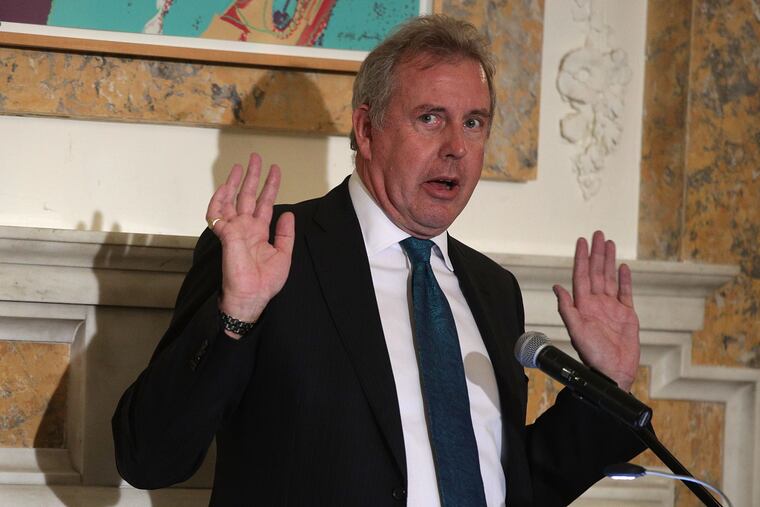Kim Darroch’s resignation reflects troubles in two democracies | Trudy Rubin
Boris Johnson, British Prime Minister in waiting, undercuts his own ambassador in Washington and hocks British sovereignty to a president whom he resembles.

The resignation of the British ambassador to Washington on Wednesday was about something much bigger than President Trump’s anger at leaked diplomatic cables that dissed him.
After all, the highly respected Kim Darroch was merely doing his job by reporting in 2017 about an “inept” Trump and a “uniquely dysfunctional” White House. Most ambassadors in D.C. were no doubt reporting the same. Moreover, Trump’s Twitter slams of foreign allies, including British Prime Minister Theresa May, underline the hypocrisy of his wrath.
The real reason Darroch stepped down is more disturbing than Trump’s tantrums: Boris Johnson, a Trump clone likely to replace May as prime minister later this month, refused to support the ambassador.
The likely ascendancy of Johnson reflects the astonishing British political parallel to America’s current political dysfunction. Praised by Trump, Johnson is widely derided in Britain as a congenital liar and unrepentant womanizer whose only ideology is self-advancement. His record in previous government posts ranges from mediocre (as London mayor) to outright failure.
Yet Johnson is poised to become Britain’s next political leader. His rise reflects the similar fraying of two great democracies on either side of the pond.
The parallels between Johnson and Trump (even apart from their poofy blond coiffures) are astounding, despite the difference between a presidential and a parliamentary system.
First is the similarity of their base. The mercurial, often reckless Johnson is almost certain to be chosen as new leader this month by around 160,000 members of the British Conservative Party, in the wake of May’s resignation as party leader. The members skew older, white, male, and ultraconservative; they are poised to reject a more conventional, Jeb Bush-like candidate, current Foreign Secretary Jeremy Hunt (who supported Darroch). This means Johnson will automatically become prime minister until the next general election.
The second similarity is Johnson’s disrespect for facts. (It’s not uncommon to see articles in the British press with titles like “The Most Infamous Lies of Boris Johnson.”)
Indeed, Johnson’s star rose in 2016 when he promoted gross falsehoods to garner support for the referendum on whether Britain should Brexit the European Union. He notoriously claimed that hordes of Muslim immigrants were coming (Britain took none of the 2015-16 Syrian refugee wave) and that Britain would get vast sums from the European Union for its health service if it left the Union (totally untrue).
Yet he was famous for “fake news” long before that, having been sacked as a journalist in younger days for fabricating quotes, and fired from a Conservative Party post for lying about an extramarital affair. The list of notorious lies goes on and on, but Boris is indifferent.
One of his most tragic, careless false claims was to say, when he was a (much-derided) foreign secretary, that a British-Iranian woman in Iranian custody had been teaching journalism in Tehran. In reality she was visiting family, and his claim has prolonged her imprisonment, according to her husband.
Now Johnson is promising Brexit miracles to his base, insisting he can take Britain out of the European Union with no deal and no economic disaster. He promises that a great bilateral trade deal with Trump will take care of any problems. All magical thinking, but the faithful want to believe.
One of the most astonishing parallels with Trump is Johnson’s checkered personal life, featuring two divorces, scandalous affairs, a child born out of wedlock, and public bragging about his prowess. Most recently, a next-door neighbor called the police after hearing his current girlfriend screaming “get off me” and loud crashing noises. Will such scenes continue at Ten Downing Street?
Yet “family values” conservatives give him a pass. Acts that would end the careers of other politicians, such as threats to the press and racist comments, are dismissed as “that’s just Boris.”
Sound familiar? One has to ask how two great democracies have reached the point where they will both soon be led by politicians who lack basic decency, morals, and respect for truth.
In Johnson’s case, two factors stand out.
Johnson cultivates a bumbling image as a jokester, and British newspapers report that his (calculated) antics appeal to jaded voters who love to see authority mocked.
More critical perhaps, he faces an opposition Labour Party that seems determined to defeat itself. Labor leader Jeremy Corbyn has refused to reach out beyond his far left base or take the pro-Europe stand most Labour voters want. Nor has he tamped down anti-Semitism in Labour’s top ranks.
In other words, Labour is failing to grasp the opportunity to stand against a Conservative Party whose leader will most likely be revealed, sooner or later, as a charlatan.
Third parties are rising in Britain, and Boris’ success in a future general election is not assured. In the meantime, praised by the White House, he promises to make Britain great again.
Instead, by rejecting Europe, Johnson will make Britain dependent on Trump’s promises, which are no more reliable than his own.